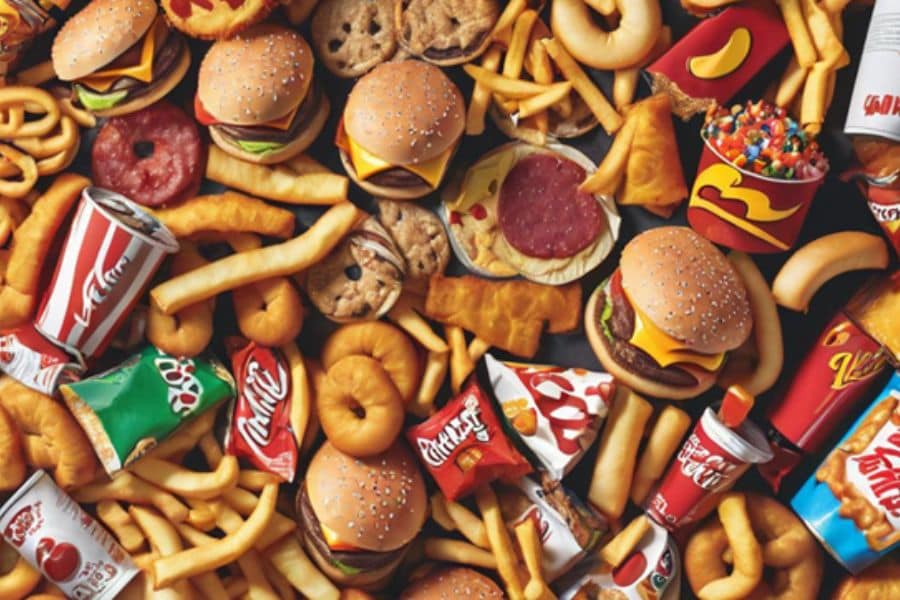We might think our food choices are entirely our own, but there's a stealthy force influencing our decisions: junk food marketing. From billboards to social media, we're bombarded with messages designed to make us crave unhealthy snacks and drinks. Let's break down how these tactics chip away at our willpower and impact our health.
Junk Food Marketing Tricks and Traps
- Sensory Overload: Bright colors, cheerful music, and smiling faces create an emotional response. These ads trigger our brains to associate junk food with happiness and fun.
- Deceptive Health Claims: Words like "low-fat," "all-natural," or "baked" create a false aura of healthiness, misleading us into thinking these products are better for us than they are. For example, Subway has long promoted itself as a healthier alternative to traditional fast food. Phrases like "Eat Fresh" and "Subway Fresh Fit" imply that their sandwiches are made with healthier ingredients. However, the nutritional value can vary greatly depending on the choices made, such as type of bread, condiments, and toppings.
- Targeting Our Weaknesses: Marketers know when we're stressed, bored, or feeling down, they exploit these moments to suggest junk food as a source of comfort or reward. However, we should remember that marketers aren't intentionally promoting unhealthy habits in children, according to CyberGhost’s blog post. Their primary goal is to boost sales and generate excitement around their products, leveraging their appeal and taste. But their advertisements effectively draw in young consumers, gradually influencing the eating habits of an entire generation towards less healthy options.
- Supersizing and Value Deals: The promise of getting more for less makes us think we're making a smart choice, even when it means consuming far more calories than we need.
- Constant Presence: Junk food ads are inescapable. They're on TV, in magazines, on our phones, and even at our kids' schools, making it harder to resist temptation.
How Marketing Rewires Our Brains
- Craving Over Logic: Junk food marketing is designed to bypass our rational decision-making. It targets the reward centers in our brains, fueling cravings and making it difficult to say no to those unhealthy snacks. For instance, Coca-Cola's "Share a Coke" campaign personalized their bottles and cans with people's names and terms like "friends" and "family," encouraging social sharing and connection. By associating their product with positive social experiences, Coca-Cola triggers cravings and strengthens brand loyalty.
- Distorted Preferences: Over time, our taste buds adapt to the overload of sugar, salt, and fat in junk food. Healthy, whole foods can start to seem bland and unappealing by comparison.
- Habits and Impulses: Junk food marketing encourages mindless snacking. Those strategically placed chips at the checkout aisle become an automatic, almost unconscious purchase.
Consequences for Our Health
Regularly succumbing to junk food marketing has serious health repercussions:
- Obesity and Related Diseases: Junk food is a leading cause of obesity, significantly increasing the risk of type 2 diabetes, heart disease, certain types of cancer, and other chronic illnesses.
- Poor Nutrition: Junk food displaces healthy options in our diet, leading to nutrient deficiencies and long-term negative health outcomes.
- Mental Health Impacts: Diets high in junk food have been linked to increased risk of depression and anxiety.
Fight Back Against Junk Food Manipulation
- Awareness is Key: Understand how junk food marketing works. Recognize those colorful ads and tempting slogans for what they are: sales pitches, not health advice.
- Limit Exposure: Reduce your screen time and be mindful of the media you consume. Less exposure means fewer cravings.
- Plan Ahead: Have healthy snacks on hand to prevent impulsive junk food purchases. Prep meals in advance to ensure nutritious options are readily available.
- Teach Your Kids: Talk to children about the persuasive nature of marketing and help them become critical consumers of media.
We may not be able to entirely escape junk food marketing, but by understanding its tactics, making conscious choices, and prioritizing healthy eating habits, we can regain control of our diets and protect our well-being.
This is a Public Relations (PR) article has been published as received without any editorial enhancement or modifications. The Telegraph Online does not endorse or guarantee the accuracy, reliability, or completeness of any information presented in this article. The organization is not responsible for any errors or omissions in the content or for any losses, damages or injuries of whatsoever nature directed towards whomsoever arising out of the use of information provided in the article.

